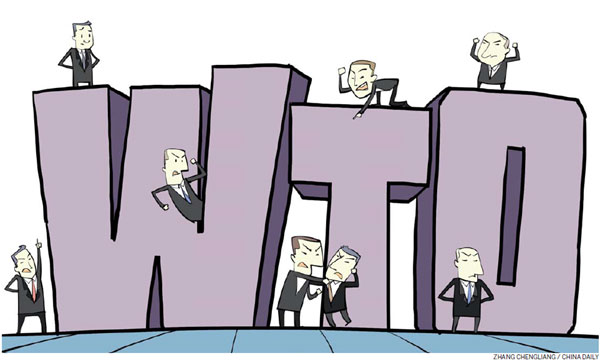No reason to deny China market economy status
Updated: 2016-01-12 10:47
By Xu Man(China Daily)
|
||||||||

The European Union will take the first step on Wednesday to debate on whether to grant China "market economy status".
The Clause 2 of Article 15 of the Protocol of China's Accession to the World Trade Organization says that when another WTO member launches an anti-dumping investigation into the products imported from China, it should not use the prices of products in China's domestic market but rather the prices of those products from a third (alternative) country as comparison.
This discriminatory practice, to be maintained for 15 years — that is, until the end of 2016 — has forced Chinese enterprises to often face unfair anti-dumping investigations by other countries. The refusal to grant China rights similar to those enjoyed by other WTO countries has dealt heavy blows to Chinese companies. And it's time the WTO prevented other members to stop taking advantage of the discriminatory policy — which in a way would also mean recognizing China as a market economy.
China is now the world's largest trading country, and acknowledging it as a market economy would be conducive to promoting global trade. China has been urging other WTO members to recognize it as a market economy, and quite a few, including Russia, Brazil, New Zealand, Switzerland and Australia, have done so. But the United States, the European Union, Japan, Canada and some regional trade organizations have yet granted China market economy status.
Within the EU, Germany and the United Kingdom have shown a positive attitude toward the move, but some other EU members seem intent on continuing their protectionist policies for fear of losing their advantages in the steel, ceramic, textile and solar power sectors.
Some countries are also worried that recognizing China as a market economy will make it more difficult for them to impose anti-dumping charges on China. And some US officials have objected to the EU's move to recognize China as a market economy, arguing that the move would be unfavorable for the US and EU members.
- Global health entering new era: WHO chief
- Brazil's planning minister steps aside after recordings revelation
- Vietnam, US adopt joint statement on advancing comprehensive partnership
- European border closures 'inhumane': UN refugee agency
- Japan's foreign minister calls A-bombings extremely regrettable
- Fukushima impact unprecedented for oceans: US expert

 Stars of Lijiang River: Elderly brothers with white beards
Stars of Lijiang River: Elderly brothers with white beards
 Wealthy Chinese children paying money to learn British manners
Wealthy Chinese children paying money to learn British manners
 Military-style wedding: Fighter jets, grooms in dashing uniforms
Military-style wedding: Fighter jets, grooms in dashing uniforms
 Striking photos around the world: May 16 - May 22
Striking photos around the world: May 16 - May 22
 Robots help elderly in nursing home in east China
Robots help elderly in nursing home in east China
 Hanging in the air: Chongqing holds rescue drill
Hanging in the air: Chongqing holds rescue drill
 2.1-ton tofu finishes in two hours in central China
2.1-ton tofu finishes in two hours in central China
 Six things you may not know about Grain Buds
Six things you may not know about Grain Buds
Most Viewed
Editor's Picks

|

|

|

|

|

|
Today's Top News
Liang avoids jail in shooting death
China's finance minister addresses ratings downgrade
Duke alumni visit Chinese Embassy
Marriott unlikely to top Anbang offer for Starwood: Observers
Chinese biopharma debuts on Nasdaq
What ends Jeb Bush's White House hopes
Investigation for Nicolas's campaign
Will US-ASEAN meeting be good for region?
US Weekly

|

|







